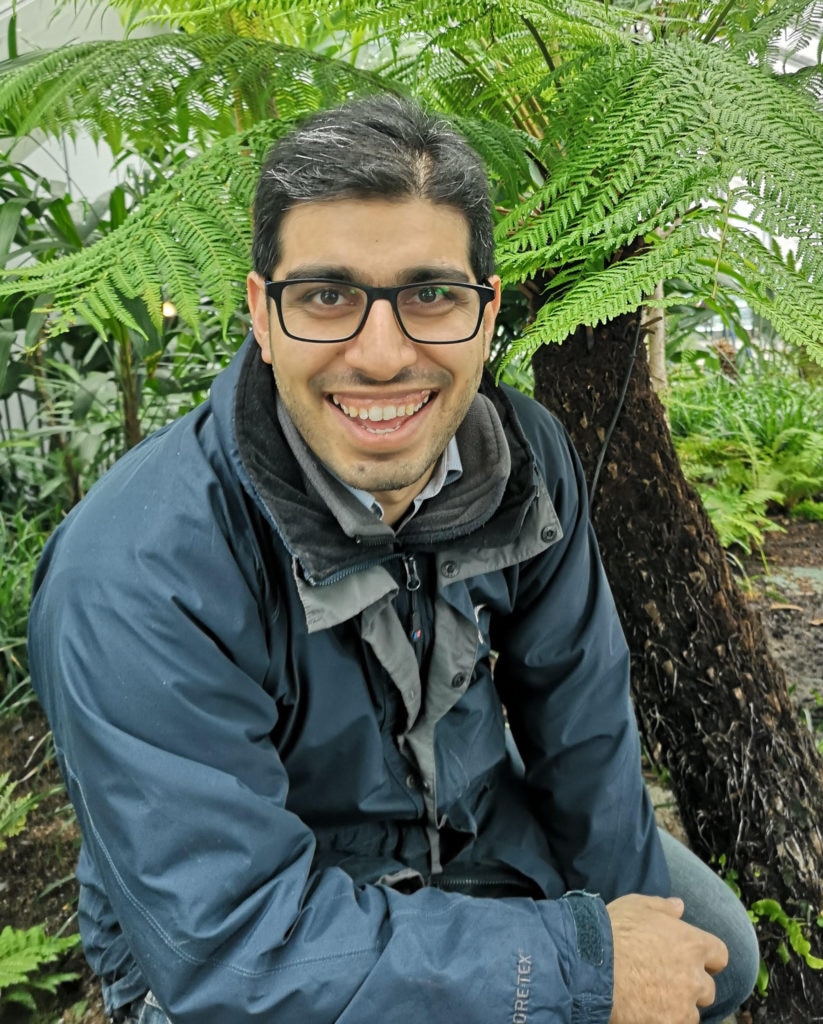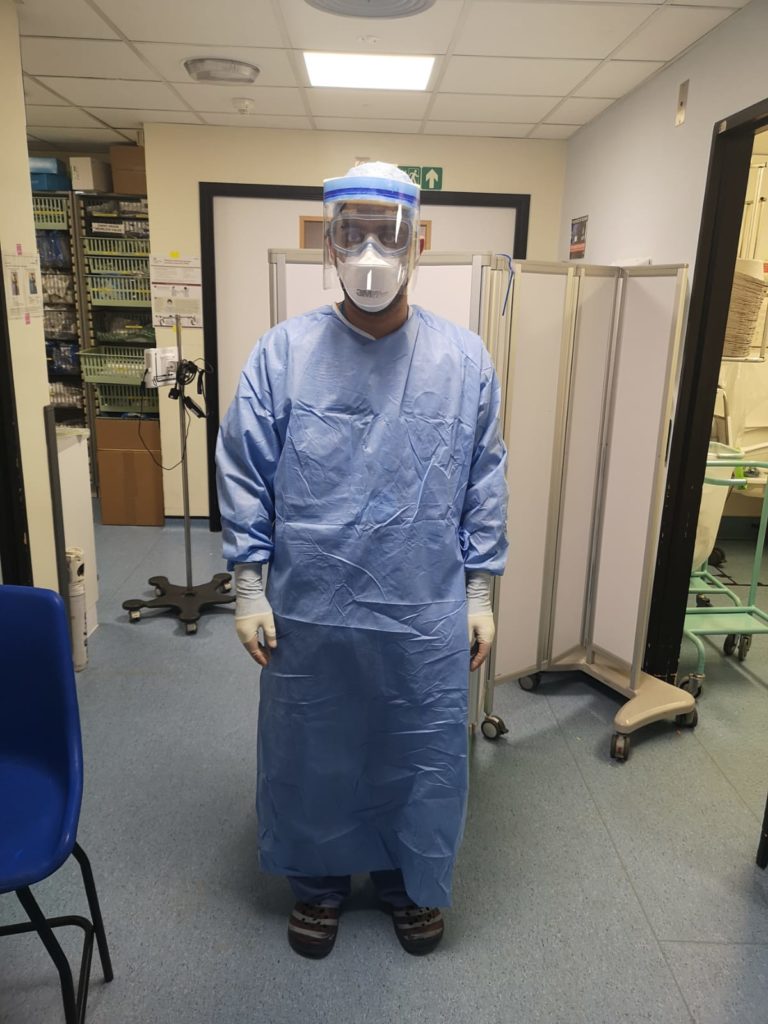Dr Shahzaib Ahmad, Intensive Care Doctor, UK

During this coronavirus pandemic, I have been blessed with the opportunity to serve at the frontline of the healthcare response, looking after the most severely afflicted and sick patients infected with coronavirus in critical care.
This is my account of how we prepared for the coronavirus and what my daily experience is.
The role of the intensive care doctor is to support a patient’s organs. When patients become very ill, some organs fail and without support, this can be fatal. We take over the job of the failing organ and give it time to recover, at which point patients can be taken off organ support. Typically, we support the lungs through invasive ventilation, support the heart through specific drugs and support the kidneys by doing temporary dialysis.
Preparation for the surge
The UK was behind China and Italy and had some time to prepare. Our intensive care unit has the capacity to ventilate a maximum of eight patients at a time, with a further seven patients who need organ support.
We had three contingency plans (Phase 1 to Phase 3) for the expected surge in the number of patients with coronavirus.
We knew from the data that came out of China and Italy that most of the patients afflicted with coronavirus only required invasive ventilation. We knew we needed more staff. Thus, all the anaesthetic colleagues (the closest specialty to intensive care and very familiar with organ support) stopped doing surgery and prepared to look after patients with coronavirus. We also knew we needed more ventilators and more drugs, and this was also being prepared.
We practiced putting on personal protective equipment (PPE) and taking it off. We ran simulation drills of how we would ventilate these patients. We identified staff with comorbidities. This meant that they could not work with patients with coronavirus and made rota changes so that we could plan to work without them.
We were told that all normal work patterns were abolished and a new rota would be sent out. There would be no normal shifts; all shifts would be 13 hours long and we would have to do far more night shifts and weekend shifts than we did previously. We were ready!
March 2020 – The surge
The first wave of patients arrived in the second week of March. Within 24 hours, we went from normal working conditions in intensive care to Phase 3. So many patients came that we had filled up all the space in intensive care with ventilated patients and we were now overflowing into operating theatres looked after by anaesthetic doctors, who were masquerading as intensive care doctors.
After the emergency rota came into play on 18 March, I was the first to be on duty. I got called to the resuscitation department of accident and emergency (A&E). I was called to see a 74-year-old man who felt extremely short of breath.

Whilst talking to me, he was unable to even finish a sentence without taking several breaths. He was being given as much as oxygen as possible without mechanical ventilation, but his oxygen levels were still too low. His comorbidities were that he had diabetes and high blood pressure. Otherwise he was well, independent and lived a normal life.
We quickly spoke to him, explained to him that he was very sick. We spoke to his family and told them that without invasive ventilation, he was unlikely to survive and even with invasive ventilation, there were no guarantees, but that was his best chance. All parties agreed to invasive ventilation.
A team of us donned our disposable PPE, which includes a mask, hat, goggles, gown and gloves. This took at least five minutes and we all checked each other to make sure that we wore our PPE properly.
My mask didn’t fit me properly and I could feel my breath leaking from the edges and misting my glasses. This wasn’t going to protect me from the aerosol generated during the procedure of putting someone on a ventilator. I found the stickiest tape I could and firmly taped the mask to my face to ensure there was no leak.
A team of us went into the room with the patient. We put our monitors on him, gave him drugs that put him into a medically induced coma (without which invasive ventilation is not possible) and then we put a breathing tube into his windpipe and connected him to a ventilator.
After this, my consultant left the room to arrange his bed in the intensive care unit and I was left to carry out further invasive procedures to ensure he could get the right drugs in the right places. In the midst of this, I noticed that my mask was causing me significant pain to my nose. I couldn’t touch it to readjust it; I couldn’t take it off; I just had to carry on.
I finished everything I needed to do and finally took off my PPE. I found my nose bruised and where I had taken the tape off, my skin had developed micro haemorrhages. I safely delivered the patients to intensive care. Then, I performed ablution.
As soon as I had done this, I got another call for another patient. This time, a 54-year-old man, who had exactly the same problem. I went through the whole ordeal again. I performed ablution again. Then, again.
Finally, for the fourth time that day, I went through the same ordeal again. The thing that struck me most about my last patient was how young he was. This one was a 38-year-old man whose only medical problem was that he was asthmatic. This one struck fear into me.
I successfully completed the high-risk procedure of ventilating the patient and delivering him to the intensive care unit. I reviewed four other patients during the day, who probably needed ventilating, but not quite yet. I told the night doctor about those four patients so that they were aware.
I got changed, performed ablution and on the way home, my mind raced. I couldn’t shake off the fear and concern that the last patient struck in me. Who could I talk to? That patient could have been a colleague, a relative or a friend.
I got into my car and on the way, called a close friend who was also an intensive care doctor. I shared my grief, worries and concerns with him. I told him that I was worried about my patients and those that were yet to come. I was worried about my family, friends and colleagues, some of whom were not dissimilar to the patients we ventilated that day.
I arrived home and called my wife to open the door, even though I have the keys. I entered the house without touching anything and went straight into the bathroom. I shut the bathroom door without using my hands and took a shower. At the same time, I washed my phone, watch and glasses. I called my parents and pleaded with them to stay indoors, no matter the temptation to go outside.
The next day, I started all over again.
How my faith helps me
Doing this job can be stressful, but there is a support that helps me get through. My most fundamental and effective support is Allah the Almighty and his Khalifa.
I listen to the words of Hazrat Khalifatul Masihaa, which are imbued with wisdom. He says that performing the ablution five times a day is a very high standard of cleanliness, so I try to do it each time after I take off my PPE having ventilated a patient. I also take the prophylactic homeopathic medicine that is advised by Huzooraa.
I go with the firm faith that my action of potentially putting myself in harm’s way by doing a humanitarian deed is pleasing to Allah the Almighty and I take comfort in that knowledge.
I also take comfort in the knowledge that from a staff perspective, we are extremely thin on the ground and therefore, my presence is sorely needed. I have trained for this; I chose this specialty to look after patients in their hour of most need, at a time when they have never been as sick as this before.
I pray for my patients and hope for their recovery. I implore you to join me through prayers.


Masha-Allah Dr. Sahib has expressed his feelings and emotions so beautifully in this article.
May Allah save the world from this pandemic soon. Ameen.
JazakAllah Wal Ahsanal Jaza Dr sahib for your services.
May Allah protect everyone Ameen
Mashallah, Alhamdulilah, SubhanAllah
May Allah accept your sacrifices and protect humanity from this evil and guide them so that they can identify their creator and turn to Him.
May Allah bless u for ur hard work and keep u and everyone in ur family safe and healthy
May Allah bless your efforts to humanity. I am not saying anything that you don’t already know and that is Saving One Life is as if You Save the Whole Humanity. I salute your courage in potentially putting yourselves in harm’s way to say a life. May Allah protect you and all frontline responders. Our prayers are with you.
Expresses so honestly that all of it has touched my heart deeply to an extent that I am praying for you , your family , your colleagues & your patient who are pivot in all this scenario, May Allah keep you healthy to help the sick! Ameen
Mashallah Dr saheb
Very stressful job this moment.
God bless you 🤲🏼
Mashallah, may Allah reward you and your family abundantly and allow you to serve the humanity to the best of your ability. Ameen
May Allah bless you and your family always Ameen
Jazakomullah for this excellent article – giving us a glimpse into the work going on at the frontline of the battle against Covid-19.
May Allah Bless you and keep you and your family under His Protection.
We are all proud of you. Your are doing a great job to fight against Covid19. You are a life saver. May Almighty Allah bless you and your family. You are a great example of our slogan. Let’s put Humanity first.
So overwhelming, yet giving hope.
You are doing noblest of jobs, by saving lives and being so much concerned about your patients!
God bless you and keep you safe.
Ameen!
JazakAllah for sharing Dr sahib
Allah bless you and be with you
Very nice
Mashallah
Well done
Mashallah may allah keep you and your family in good health